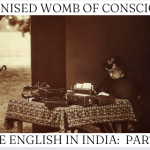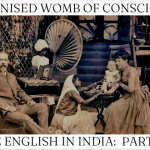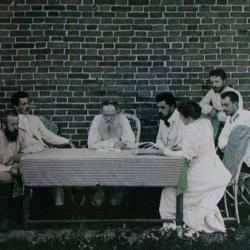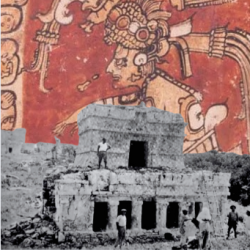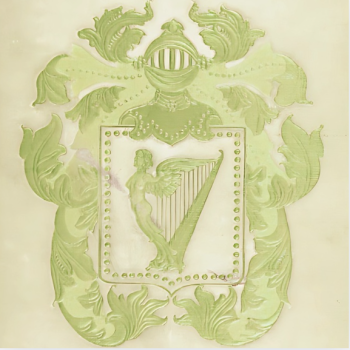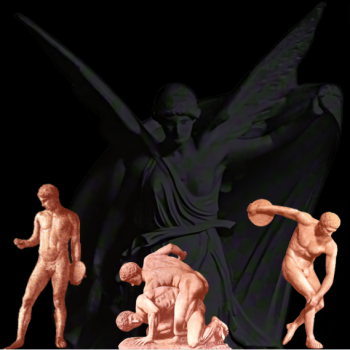THE ENGLISH IN INDIA PART II.
⸻
Part two of “The English in India” in Charles Johnston’s story:
⸻
The men who made up the administrative body of the British East India Company (EIC,) received their education at the company training school called Haileybury College. Their education was sponsored through a system of patronage. They were known, variously, as the “Covenanted Civil Service,” “Covenanted Civilians,” and “Covenanted-Wallah,” so-named because each member entered into a covenant of nine clauses with the Secretary of State for India before taking up service. The title “Covenanted Civilian” was initially reserved only for graduates of Haileybury College, but after 1855 it was applied to any successful candidates of the competitive open-examinations (more on that below.) This administrative body numbered anywhere between 900 and 1,ooo at any given time. Though native Indians were not excluded from the competition in London, the various obstacles they faced in actualizing their candidacy overseas was so great, that they may as well have been. In 1888, when Charley sat for his final examination in London, only twelve Indians had entered the Covenanted Service. (Most of the Indians in the government manned the lower rungs of the administrative ladder, and were known as “uncovenanted servants.”) When the British Crown superseded the East India Company in 1858, the Indian Civil Service (ICS) replaced the administrative body of the EIC, but preserved the title Covenanted Civil Service.)
⸻
The final years of the EIC coincided with a period of crisis and reform at the ancient universities of Britain. The two primary issues were the catalyst for this reform. The first was a rise in the number of university graduates and a lack of corresponding opportunities in the job market (law, the church, education, etc.) The other issue was an identity crisis. In the mid-Victorian era, the state was compelled to intervene and reform Oxford and Cambridge (which I will refer to using the portmanteau “Oxbridge” unless noted.) Between 1850 and the 1880s, a series of governmental commissions of inquiry (royal, statutory and executive) forced the university politicians to present a formal report to the nation. This was a period at Oxford which saw the rise of the Oxford Movement or Tractarianism (and eventually pave the way for Anglo-Catholicism.) It became necessary, through reform, to satisfy the strong sentiments in the public that the universities, ostensibly founded for the benefit of the whole nation, had been taken over by zealous idealogues. Men like Benjamin Jowett of Oxford, wanted to “convert the ancient universities into training grounds for politicians and administrators.”
In this spirit of reform, the Secretary of State for India, Sir Charles Wood closed Haileybury College and abolished its system of patronage. Wood then implemented a system of recruitment which relied on competitive open-examinations, which, along with the age limit for taking them (17-22,) and the benefits of an Indian career, Wood believed, would lure intelligent candidates from Oxbridge of high character. His plan was initially successful; during the first year in which the open examination was held (1855) 70% of the successful candidates were Oxbridge-educated.
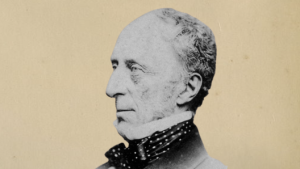
Charles Wood.
The Irish, for a time at least, would be the real beneficiaries of the open competition. In 1857, despite Ireland’s population comprising only 20% of the United Kingdom, Irish universities supplied 33% of the ICS candidates. For context, between the years 1809 and 1850, Irish candidates made up less than 5% of Haileybury’s student population. For the first time in her history, Ireland sent a disproportionate number to govern Britain’s most revered colonial possession. (Charley would write a survey of Irish involvement in the British Empire in chapter 33 of his book, Ireland’s Story.) Along with London University, Trinity College, Dublin (TCD,) was one of the first universities to assist its students in preparing for the ICS exams. Ireland’s most prestigious college understood, early on, the employment opportunity which the open-competition of ICS offered. Having educated Protestant ascendancy since 1592, TCD had a long tradition of preparing students for elevated positions in society and government. In the late 1850s, TCD established chairs in Sanskrit and Arabic, and began courses in zoology, subjects which featured prominently on the ICS examination. It was at this time that Charley’s neighbor, Mir Aulad Ali, was offered the professorship of Oriental Languages at TCD.
⸻
ICS open examination proved popular, but potential candidates soon realized that universities provided inefficient preparation for the test. As “nature abhors a vacuum,” a more effective manner of training soon appeared. The Cram School or “crammer,” was a test-prep center which taught its students the skills with which to successfully pass the ICS exam. The phenomenon of crammers which arose in the mid-19th century, was the market economy’s response to the new centrally-supervised educational system which was the de facto gatekeeper that controlled access to a system of public employment ranging from postman to permanent secretary. To get access to these positions, one had to prove they possessed the qualifications conferred by the adjudicators of these examinations. Two characteristics of the ICS open examination increased the popularity of the crammers: their multidisciplinary focus, and their low maximum age for enrollment. Cramming, aside from being deemed intellectually superficial, added tinder to the flames of doubt regarding the quality of the competition-wallah.
The examination was designed to attract Oxbridge graduates, but, in this case, theory and reality were at odds. Not unlike the crammers, English public schools were narrowly focused on mathematics and classics for the honors examinations at Oxbridge. The key to successfully passing those exams was to ruthlessly concentrate on a single subject (and the specific requirements of tripos and schools within that subject.) The ICS examination, however, only allocated 19 percent of the maximum possible marks to classics and mathematics, making it nearly impossible for students interested in an Oxbridge education to prepare for the ICS exam.
Examination Papers were set in sixteen subjects, and marks gained by a candidate in any paper were added together to formulate their final grade. Candidates, therefore, sat for every examination in which they were confident they could gain a few marks. A minimum threshold was then introduced, below which no marks were carried forward to a candidate’s total. This, in turn, limited candidates to four or five subjects, which was still enough to compel candidates to train at the crammers.
The broad spread of topics in the exam was an idealistic reluctance to favor or exclude any type of intelligence, “reputable discipline,” or university. An adjustment of marking system could have encouraged greater specialization within a broad set of subjects, but the examination system itself originated as a rebuke against Haileybury’s vocational education in favor of a distinguished, wide-breadth “liberal education.”
Another factor which drove candidates away from universities to the crammers was the lowering of the maximum age limit for entry to the open examination. Most students at Haileybury had gone out to India between the ages of 18 and 19. If their successors hoped to benefit from a university education, they would have to go out much later. The committee responsible for the ICS exam, therefore, raised the maximum age at which candidates could sit the open examination to 25. It was soon discovered that the older a man went out to India, the more difficult it was for him to acclimate to the “culture shock” of India. These older recruits were also less inclined to accept the drudgery of an Indian Civil Servant’s life. A stereotype developed among the English aristocracy, that the ICS was inferior to domestic appointments, and a regression in their career.
There was also a growing dissatisfaction in India among the senior Civil Servants with the quality of the training the new recruits (probationers) received after their arrival in their respective presidency. The veteran bureaucrats were too busy administering the government to to teach the grammar of Indian languages and the principles of jurisprudence to the new arrivals. It was clear that the probationers would benefit more from a preliminary training in England, and additional training meant additional time. Unless probationers deferred their arrival in India until their late twenties, it would be necessary to reduce the maximum age for admission to the open examination.
In 1859 the age limit was reduced to 23, and in 1865 it was still further reduced to 21. The number of successful university graduate candidates fell. Oxbridge (whose students graduated later than their counterparts at the Scottish, Irish, and Indian universities) was particularly affected. The graduate simply did not have time to successfully prepare for the ICS examination; any time spent studying for the ICS exam meant time not dedicated to studying degree examination at university. Candidates brave enough to compete in both the ICS exam and their university exam risked failure in both.
⸻
Anxieties regarding the competency of the open-exam candidates, or “competition-wallahs” as they were known, soon arose. Perhaps the “competition-wallahs” were more intelligent than their Haileybury-educated predecessors, but were they well-rounded gentleman? Did they possess the moral and physical fortitude so important during the era of Muscular Christianity. It was believed that that physique of the “competition wallah” was compromised by the excessive studying required to pass the open examination, that their health would fail in India. Most importantly, could the “competition-wallahs” inspire respect in the natives subjects?
Just as soon as the open-examination was introduced, shaking up the social backgrounds of the civil servants, debate soon turned to the representation of British authority in India. For the first time since the advent of the long, tedious, discourse on race science (read more here,) the suitability of the physical body of the competition-wallah as a representative of the British Empire was called into question. Leading English authorities strengthened their claim to the superiority of the “Anglo-Saxon race” by virtue of their intellectual, technological, and colonial progress. The body of the the Anglo-Saxon “sahib,” was seen as the template for “manly prowess,” while the bodies of their Irish and Indian counterparts were mocked for having “weakly constitutions.” When the first wave of competition-wallahs arrived in India, their physique was critiqued by ICS authorities who claimed they lacked the vigor of their Haileybury predecessors, and could not ride a horse (a skill which they claimed was essential to the execution of their duties.) Wood was among the Anglo-leaders of the time who held the belief that English gentlemen were the most suitable guardians of the British Empire, and doubted the ability of the Irish to either rule themselves, or govern others. Irish was synonymous with Catholic, and even “socially respectable” Irish Protestants were dismissed as “bullheaded Celts,” “Ultra-Hibernians” and “wild Irishmen.” An excerpt from the September 18, 1858 issue of The Saturday Review states:
The Dublin University, instead of influencing the nature of the test, is, itself, profoundly affected by it. It educates a number of young men up to the requirements of the Indian examiners, a process followed by consequences exceedingly intelligible to those who have made a study the competitive system, but far from reassuring to those who are solicitous for the efficiency of the service recruited on the new plan. For we perceive that several of the most successful candidates have been close to the top in all, or nearly all, the branches of competition. Great is the exaltation of the Irish journals at this success; but what does it prove? Principally, that the system is working in a manner altogether different from the intentions of its originators. Lord MaCaulay and the other authors of the change certainly anticipated that the different branches the competition would check each other. The mathematician was to have his chance in mathematics, the scholar in classics, and so forth. Could they have known that in a particular examination several gentlemen would appear at the head of the list at once in classics, mathematics, modern languages, and mental philosophy, they would have considered the result as telling heavily against the experiment, since nothing could have produced it except a low standard, a slack competition, or energetic cram. The examination being now under the control of the Civil Service Commissioners, we presume that the standard has not been unreasonably lowered, but the competition, from the causes we have mentioned, which are of course additionally powerful in the present state of India, has not been as animated as the greatness of the prize deserved, and as for cram, we fear it is flourishing like a green bay-tree. So far as we see, there is no cure for it except fixing the standard in each branch of examination at so great a height as to forbid apparent proficiency in too great a variety of subjects. Yet this expedient bas its drawbacks, for it is apt to place a few special men at the head of the list, while it tails off the rest in a ruck of indistinguishable mediocrity.
What, after all, is at present the result of recruiting the Civil Service by competition instead of nomination? Simply this. We are substituting Irishmen for Scotchmen in the Civil Government of India. Englishmen, who are impartial judges of the question, may be allowed to ask whether the empire gains by the exchange. There are some points of national character in which Scotch and Irish agree. They are equally noted at home for their local patriotism and narrow religious prejudices. Are they, then, equally to govern a strange country and to deal with men of strange faith? The answer must certainly be in the negative as regards Scotchmen. It is one of their oddest peculiarities that, separated from their blessed native land, become the most cosmopolitan of human beings. A Scotchman in India puts his nationality and his Calvinism in his pocket, and no more thinks of obtruding his home habits on the native than of forcing Fakirs to dilute Ganges-water with whisky, or to sing [the songs of Robert] Burns to an accompaniment of tom-toms. As a fact, the Europeans who most understood the natives, have most sympathized them, and won most of their confidence, have been Scotchmen. When, then, we insist on substituting Irishmen for them, it is a fair question whether the favoured race is distinguished by the same characteristics. Is it or is it not that an Irishman is the same everywhere—in New York as in Tipperary, in St Francisco as in Dublin. Is it or is it not true that he carries his religious prejudices everywhere, that he can always be mastered by any one adroit enough to use them, and that he is everywhere anxious to secure their ascendancy? If this be true of him, it is not much to the purpose that the new Irish civilian will be a universal genius at twenty, while his Scottish predecessor was a long-legged and at first ignorant animal, who developed slowly, and rarely found all his wits till he close upon thirty.
The article went on to state that the Irish were “unfit to govern a strange country” and made a case for reform in the recruitment system. To entice the graduates of English public schools, Wood assigned greater numerical value to subjects commonly taught in the premier English schools. Wood also redistributed the point-system on the examination to handicap the efforts of the crammers who proved quite successful at preparing their students for the tests. The weight of the points allotted to Arabic and Sanskrit (subjects in which the Irish excelled) were also reduced. Unable to realize his goals of sending both upper-middle-class Oxbridge graduates and young moldable officers to India, Wood also lowered the maximum testing age to 19. Irish university candidates, who rarely completed their degrees before 20, were adversely affected. Inasmuch as many Irish youths could neither afford nor wished to undertake the long, arduous journey to England to attend the Cram Schools, and as Irish intermediate education was often inferior to that which could be obtained in England, these reforms effectively discriminated against all potential Irish recruits, university and non-university educated alike. Whereas one-third of all Irish competitors passed the exam between the years 1856 and 1863, for the remainder of the 1860s, Irish success rate averaged around 20%. The fear of attracting “undesirables,” and the mid-Victorian anti-Irish prejudice significantly reduced the number of Irish who entered the Civil Service by the early 1870s. This prejudice was present in India, but it rarely manifested as outright discrimination (distinctions among the English, Scots, and Irish, were less pronounced in India by the more visible differences between the British and their Indian subjects.) A glimpse of the sentiment can be found in a statement by John Gerald Ritchie, the Collector of Murshidabad, who echoed the Irish stereotypes when describing Charley:
At the same time as we arrived there had come a strange couple. He was a newly arrived civilian, a handsome if rather sickly-looking young man, entirely educated at home, in Ireland, with his head full of the most advanced ideas, a Theosophist, radical, vegetarian and I know not what else. I found him a difficult subordinate to train. His wife was a Russian girl, red-haired, with great blue eyes. There was something very taking about her, but she was wild and uncouth. This original pair were christened the Popoffs. (Ritchie, John Gerald. The Ritchies in India.)
Charley, perhaps self-consciously, echoes this prejudice in his description of Ritchie when he writes:
One dappled afternoon, the big Collector Sahib [Ritchie]—big morally, big physically even from the standpoint of the Assistant Sahib [Charley,] who at the physical examination in London measured five eleven and a half; big most of all in heart—thus addressed his junior officer, pointing toward the white buildings out in the heat. (Johnston, Charles. “Kandi Subdivision.”)
In another article, Charley describes a ride on horseback which, knowing the reasoning behind the prejudicial inclusion of horse-riding as a qualification for admittance into the ICC, could be read as a subtext of defiance regarding Irish ability:
Within a quarter of an hour I was driving, as fast as the Collector Sahib’s fine trotter could carry me, up that long road beneath the cocoanut palms, where the fateful bullock-cart had disappeared in the hour before noon. (Johnston, Charles. “How The Army Was Kidnapped.”) [It’s important to note that the above articles were written in 1912 and 1914 respectively. It was a time when the British considered introducing an Irish Home Rule Bill.]
⸻
By the 1870s nearly all successful ICS candidates attended a crammer, but it was the very success of these crammers which awakened the hostility that would ultimately deny them their share of the pedagogical trade. Cramming was seen as the antithesis of the liberal education on which the entire project of the open examination was predicated. In 1874 the Secretary of State for India, the Duke of Argyll, initiated an inquiry to reveal the how extensive cramming was, and seek alternatives to address it. Argyll initially decided to revive Haileybury College as a constituent college in one of the ancient English universities, but the pushback from Oxbridge proved the death knell of Argyll’s proposal. University politicians, however, suggested another plan, one that would allow probationers to go out to India while young, and receive a university education after selection: (1.) Reduce the maximum age limits for candidates entering the open exam to the mirror the average age of university enrollment. (2.) Add a provision at participating universities whereby probationers of the ICS exam were offered a special two-year course that lead to the further examinations. (3.) Residence at a participating universities (initially Oxford, Cambridge, and London) would be required (in response to the crammer lodgings.) To subsidize the cost of room and board, probationers would be granted a stipend by the India office. The solution proved a success, and in 1877, a communication was received by the Provost and Senior Fellows from the Secretary of State for India that TCD was added to the list of the Institutions in which Selected Candidates for the Civil Service of India would be permitted to reside.
As mentioned in a previous post, Charley developed an interest in philology in the early 1880s around the time that the Aryan question was being much-discussed (read more here.) Like the Sanskrit Revival in India, a movement was underway known as the “Irish Language Movement (ILM,)” spearheaded by “The Society for the Preservation of the Irish Language (SPIL,)” to preserve the ancient language of Ireland which was being eradicated under English Rule (more on that here.) To control language is to control thought. As was the case in India, the reclamation of language was a reclamation of the soul of a people, naturally, England’s first colony and her Indian colony had quite a bit in in common on this ground. Works like Ulick Bourke’s 1875 book, The Aryan Origin of the Gaelic Race and Language, sought to popularize the “Aryan” origins theory of the Irish people, and use “Aryanism” to bolster national pride in the attainments of Ireland’s past. Mir Aulad Ali, a supporter of the ILM, would state at the 1882 SPIL conference:
[Mir Aulad Ali] believed that the Celtic nation had its origin in the East they had come from Central Asia and he would not be surprised if at some future time they were traced to the neighbourhood of Kilaat, which was plural of the word Kelt or Celt, and which was in Central Asia. They might have migrated from that part of the globe and settled here. Most astonishing of all was this—though nearly secluded from the entire universe—how they progressed in art and science. They had left behind them the monuments of their learning, of their ability and of their skill in the various arts and sciences. It was not becoming in any enlightened government to suppress the language of such a people, however inferior that language might be; but it was more than barbarous not to encourage a tongue that was most ancient, most expressive, most eloquent, and superior in a great many respects to many of the languages of the neighbouring nations. “I know,” said [Mir Aulad Ali] “that many a young fellow is sent to India and placed over the people who has dangerously little knowledge of their language.” How striking was the resemblance between this ancient Celtic tongue and the Eastern languages [Mir Aulad Ali] could not overlook, as they bore the greatest proof of their antiquity.
Charley would publish a similar sentiment (but with the added element of Theosophical cosmology,) in Ireland’s Story (1905):
The ancient Greeks and Romans describe a far-northern race, whom they called the Hyperboreans, who dwelt in caves, in the north of Europe, several thousand years ago. They were men of small stature, sallow complexion, and black hair, and everything goes to show that they are the same race which Irish tradition Probably calls the Firbolgs. While this race is old enough by the to have built the cromlechs, several considerations keep us from believing that they did so. The chief of these is that of locality. The cromlechs are found over a large area, and in many regions where there were no Firbolgs or Hyperboreans to build them. There is [a] race which is probably that called Fomorian by Irish tradition, whose distribution coincides exactly with that of the cromlechs and stone circles. The tribes of this tall dark race seem to have had their centre of dispersion near Gibraltar, and to have spread in two directions […] As they seem to have come from Mount Atlas, and always kept close to the Atlantic, the tribes of this race have been called Atlanteans […] This strong and athletic race, full of the spirit of adventure, must have ruled for long centuries in a land of peace and plenty, engaged, amongst other things, in building temples and tombs containing blocks of stone so large that a thousand men could hardly lift them. Its rulers must have held great power to command such work. (Johnston, Charles; Spencer, Carlita. Ireland’s Story.) [Its worth noting that Hyperborean and Atlantean peoples factor into the Cyclical Cosmology of Blavatskyan Theosophy.]
⸻
So why did Charley choose to join the ICS? Initially, per his father’s wish, Charley considered ordination in the Church of Ireland, and was on the fence about entering the ICS. In a letter to his father in early 1885, Charley writes:
I find I can’t can’t go in for the Indian Civil Service, as it certainly comes under the head “Treasures upon Earth” […] I am not quite sure yet whether I should read for the Irish Church, or join the Colonial and Continental Society.
It was only around the time that Charley joined the Theosophical Society, and when his father lost his job as Inspector of the Fisheries, that Charley decided on a career in the ICS. To seek relief from his creditors, his father, William Johnston, expressed an interest in a colonial governorship. Like other landed Unionists, it was straightened finances, rather than a commitment to Empire, which dictated that particular career path. We might assume that Charley (and his brother Lewis who also joined the Civil Service) was influenced by his father.
⸻
Charley would enter the East Indian Civil Service in April, 1886, as the 134th candidate from TCD to be admitted. During this time he was among the Irish minority. In the 1880s the number of successful Irish university students who passed the Examination had fallen below 5% of the total intake. Nevertheless, for the next two years Charley would “industriously” study Sanskrit, and Bengali. Of this time, Charley states:
There has also been a systematic cultivation of the hundreds of languages and dialects spoken by India’s three hundred millions.The popular tongues are not less carefully studied. It is an international jest of some antiquity, that Englishmen never know foreign tongues. The truth is, that no nation knows so many, or has reduced so many to writing for the first time. The British Indian Government, if my memory serves me, recognizes over a hundred different tongues and idioms; and there are at least a few officials conversant with each of them. And we have to get something more than a smattering of these tongues. We have to learn to read them, write them, and speak them fluently to the natives, using the proper forms to mark all the shadings of social rank. The members of the Covenanted Civil Service generally know three or four vernaculars well, reading, writing and speaking them fluently and correctly […]By dint of hammering away, the Civilians come to learn the native tongues, in all their richness and variety, very thoroughly and correctly. Most of them also know Greek and Latin, and two or three modern European languages, this as a result of the severe examinations which they have to pass, to enter the Indian Civil Service. (Johnston, Charles. “Helping to Govern India.”)
As for the rules of the Indian Civil Service probationer that Charley would have experienced, an aggregate of excerpts from the 1887 & 1888 copies of the rulebook give us some idea:
(2.) No person will be deemed qualified who shall not satisfy the Civil Service Commissioners:—
- That he is a natural born subject of Her Majesty.
- That his age will be above seventeen years and under nineteen years on the 1st January, 1887. [N.B.—In the case of Natives of India this must be certified by the Government of India or of the Presidency or Province in which the Candidate may have resided.]
- That he has no disease, constitutional affection, or bodily infirmity unfitting him, or likely to unfit him for the Civil Service of India.
- That he is of good moral character.
(3.) Should the evidence upon the above points be prima facie satisfactory to the Civil Service Commissioners, the Candidate on payment of the prescribed fee, will be admitted to the Examination. The Commissioners may however, in their discretion, at any time prior to the grant of the Certificate of Qualification hereinafter referred to, institute such further inquiries as they may deem necessary; and if the result of such inquiries, in the case of any Candidate, should be unsatisfactory to them in any of the above respects, he will be ineligible for admission to the Civil Service of India; and if already selected will be removed from the position of a Probationer.
(4.) The Examination will take place only in the following branches of knowledge:—
- English Composition—(300 Marks.)
- History of England (including a period selected by the Candidate)—(300 Marks.)
- English Literature (including books selected by the Candidate)—(300 Marks.)
- Greek—(600 Marks.)
- Latin—(800 Marks.)
- French—(500 Marks.)
- German—(500 Marks.)
- Italian—(400 Marks.)
- Mathematics (pure and mixed)—(1,000 Marks.)
- Natural Science; that, is the Elements of any two of the following Sciences, viz.:—Chemistry (500 Marks,)—Electricity and Magnetism (300 Marks,)—Experimental Laws of Heat and Light (300 Marks,)—Mechanical Philosophy with Outlines of Astronomy (300 Marks.)
- Logic—(300 Marks.)
- Elements of Political Economy—(300 Marks.)
- Sanskrit §—(500 Marks.)
- Arabic §—(500 Marks.)
Candidates are at liberty to name any or all of these branches of knowledge. No subjects are obligatory.
(5.) The merit of the persons examined will be estimated by marks; and the number set opposite to each branch in the preceding regulation denotes the greatest number of marks that can be obtained in respect of it.
(6.) The marks assigned to Candidates in each branch will be subject to such deduction as the Civil Service Commissioners may deem necessary in order to secure that “a Candidate be allowed no credit at all for taking up a subject in which he is a mere smatterer.”
(7.) The Examination will be conducted on paper and viva voce, as may be deemed necessary.
(8.) The marks obtained by each Candidate, in respect of each of the subjects in which he shall have been examined, will be added up, and the names of the several Candidates who shall have obtained, after the deduction above mentioned, a greater aggregate number of marks than any of the remaining Candidates will be set forth in order of merit and such Candidates, shall be deemed to be Selected Candidates for the Civil Service of India, provided they appear to be in other respects duly qualified. Should any of the Selected Candidates become disqualified, the Secretary of State for India will determine whether the vacancy thus created shall be filled up or not. In the former case, the Candidate next in order of merit, and in other respects duly qualified, shall be deemed to be a Selected Candidate A Selected Candidate declining to accept the appointment which may be offered to him will be disqualified for any subsequent competition.
(9.) Selected Candidates, before proceeding to India, will be on probation for two years, during which time they will be examined periodically, with a view of testing their progress in the following subjects:—
- Law—(1,250 Marks.)
- Classical Languages of India: Sanskrit—(500 Marks,) Arabic—(400 Marks,) Persian—(400 Marks.)
- Vernacular Languages of India [excepting Hindustani when taken up by Madras Candidates and Gujarati]—(400 Marks each.)
- The History and Geography of India—(350 Marks.)
- Political Economy—(350 Marks.)
In these Examinations, as in the Open Competition, the merit of the Candidates examined will be estimated by Marks, and the number set opposite to each subject denotes the greatest number of Marks that can be obtained in respect of it at any one Examination. The Examination will be conducted by means of printed questions and written answers, and by viva voce Examination, as may be deemed necessary. The last of these Examinations will be held at the close of the second year of probation, and will be called the “Final Examination,” at which it will be decided whether a selected Candidate is qualified for the Civil Service of India. At this Examination Candidates will be permitted to take up any one of the following branches of Natural Science, viz.: Agricultural Chemistry, Botany, Geology, or Zoology, for which 350 Marks will be allowed. Candidates for Madras and Bombay will also be permitted to compete for Prizes in Hindustani and Gujarati, respectively.
(10.) Candidates will be tested during their probation as to their ability to perform journeys on horseback, and no Candidate will be deemed qualified for the Civil Service of India who fails to satisfy the Civil Service Commissioners of his competence in this respect.“
(11.) Any Candidate who, at any of the periodical Examinations, shall appear to have wilfully neglected his studies, or to be physically incapacitated for pursuing the prescribed course of training, will be liable to have his name removed from the list of selected Candidates.
(12.) The selected Candidates who, at the Final Examination, shall be found to have a competent knowledge of the subjects specified in Regulation 9, and who shall have satisfied the Civil Service Commissioners of their eligibility in respect of nationality, age, health, character, and ability to ride, shall be certified by the said Commissioners to be entitled to be appointed to the Civil Service of India, provided they shall comply with the regulations in force at the time for that Service.
~
The Civil Service Commissioners are authorized by the Secretary of State for India in Council to make the following announcements:
(2.) The Probationers, having passed the necessary Examinations, will be required to report their arrival in India within such period after the grant of their Certificate of Qualification as the Secretary of State may in each case direct.
(3.) The seniority in the Civil Service of India of the selected Candidates shall be determined according to the order in which they stand on the list resulting from the Final Examination.
(4.) An allowance amounting to £300 will be given to all Candidates who pass their probation at one of the Universities or Colleges which have been approved by the Secretary of State, provided such Candidates shall have passed the required Examinations to the satisfaction of the Civil Service Commissioners, and shall have complied with such rules as may be laid down for the guidance of selected Candidates.
(5.) Selected Candidates desiring to remain in this country an additional year after the completion of their two years probation for the purpose of taking a Degree at one of the Universities above-mentioned, should apply to the Secretary of State for India for permission to do so. Besides the allowances above-mentioned, a bonus of £150 will, as a temporary and experimental measure, be paid to any Candidate who, having obtained permission to remain an additional year, passes an examination qualifying for a Degree in Honours at Oxford or Cambridge, or, being a student of University College, London, passes with credit an Honour Examination of the University of London. This privilege will be here after extended to any other of the Universities above referred to, at which an academical distinction is obtainable which, in the opinion of the Secretary of State, corresponds to a Degree in Honours at Oxford or Cambridge, and to obtain which the additional year’s residence in this country is necessary.
(8.) Candidates rejected at the Final Examination of 1890 will in no case be allowed to present themselves for re-examination.
Charley’s “final examination,” was held in London in August 1888, at the close of the second year of probation. He passed the exam with 1,883 marks, and increased his position by eighteen places. In consequence of this, Charley was entitled to the fifth place among the candidates selected in 1886 for the Bengal Division of the Presidency of Fort William, and awarded the Sanskrit prize of £40 (about £6,650/$8,185 in 2023.) Like all newly-minted Covenanted Civilians. Upon arrival in Calcutta on January 5, 1889, Charley was notified that he would be stationed in Berhampore, in Murshidabad, West Bengal.
⸻
We’ll explore the framework of the Raj (and the role the Theosophical Society played in shaping policy) in the next section, so we’ll conclude here with two statements regarding Charley’s view of the colonial government and compare it with his interpretation of the ideals of the Theosophical Society:
For uniform democratic government presupposes a certain uniformity in the citizens of the democracy, a uniformity of race, a common tongue, or at least some easy mode of intercommunication, and a fairly uniform culture and public opinion. Without this uniformity, democratic institutions will mean a perpetual oppression of minorities, and will result in anything but freedom. But the principle put in force in India does result in a very large measure of real freedom. There is, first, as we saw, the securing of universal and inviolable civil rights, with open and equal justice to all. Then there is the sympathetic and systematic study of each community, to learn its religious, moral and social tradition, its mental atmosphere, its ideals and usages [italics mine.] And, as a result, there is the wise and uniform application of these religious usages within that community, in the way which best suits its own genius and temper.(Johnston, Charles. “Helping to Govern India.”)
***
What has been the attitude of England towards all these warring cults? It has been toleration, the broadest and truest toleration the world has ever seen. Not only are all these heated sectarians taught to dwell together in mutual amity and respect, but further there is a defined and fully conscious conservation of whatever is best in the genius of each faith. Each one of the old religions represents not only an attempt to explain the riddle of the world [italics mine,] but also a system of domestic and social life, entering into minute details of sentiment, of habit, of social and personal feeling. The English in India, recognizing this, have followed the lines of natural and age-long growth, and have give to the devotees of each of these different faiths a government in harmony with their particular genius. (Johnston, Charles. “The English in India.”)
It is Charley’s confidence on two particular points which suggests another reason why he might choose a career in the ISC: “the sympathetic and systematic study of each community, to learn its religious, moral and social tradition, its mental atmosphere, its ideals and usages,” and “each one of the old religions represents not only an attempt to explain the riddle of the world.” In an address delivered at the Theosophical Convention of 1908, Charley states:
It recently befell me to read the old records, from the late fifteenth century downward, of the first contact of our white races with the colored races of Asia and the races of the New World. And as I read, I felt profoundly ashamed for the men of my own color; whether in the East, or in the West, the tale was marred by spoliation, craft, robbery, violence, dishonor. It is a dark and evil record; and one cannot read it without shame. Here, once more, it is true that our own days have seen much betterment; yet very much remains to be done. It cannot be doubted that within a few years we shall see the yellow races of Asia, to the number of five hundred millions, as fully armed and equipped with our best inventions as are the Japanese, the pioneers of the yellow races, today. What shall we do in the face of that world-problem? What shall we do, a little later, when a like world-problem arises in Africa, with its uncounted millions of the black race? I answer, if we are to meet these problems with safety, we must put in force the Theosophical method. Instead of dwelling on the differences between us and these men of other hue until we come to hate them, we must approach them in a kindly spirit of understanding; recognizing frankly their good and lovable qualities, their strength in certain things wherein we are weak; our ability to help them in those things wherein we are strong. Thus coming into friendly and cordial relations with them, we shall presently come to see that there is no necessary strife between us; that our likenesses are far more vital than our differences; and that, as for our differences, the wise thing is to accept them frankly on both sides, agreeing to differ, in the genuine Theosophical spirit. Thus, and only thus, can we safely surmount the difficulties, piling up mountain high, between the races of different color, difficulties which it is for our century to solve, on pain of throwing the human race into internecine strife and confusion for generations. Here, the Theosophical method is infinitely more potent than fleets of battleships, and infinitely more benign.
As Theosophists we by no means desire that all men should ignore their differences in a dead level of uniformity. This is not our ideal, whether for humanity as a whole, or for our Society in particular. We in no way seek uniformity of opinion, unanimity of belief. On the contrary, I for my part would welcome a far greater diversity of opinion, of belief, of faiths, of races, than exists in our Society today. We ought to have many races and creeds represented. Indeed, we should have men and women of every race on the globe within our ranks, and we would welcome them there. Nor should we seek to minimize their difference; on the contrary, we should ask each to express his own ideal, the ideal of his own race and faith, in its highest and noblest form; and then ask that all should admit and accept these differences, in the spirit of perfect tolerance and freedom, the spirit of that deeper unity which underlies all difference. Thus we should have assembled the grand orchestra of man. And just as, in the orchestra of the musician, we do not ask the violins to become uniform with the trumpets, nor the harps to repeat the note of the horns, but rather demand that each shall be perfect in its own kind, the harp as a harp, the violin as a violin; so in that greater orchestra of man, we should ask that each should be his or her best self, his or her own highest attainment, and so should we see perfected the true universal brotherhood of mankind. (Johnston, Charles. “What the Theosophical Society is Not.”)
AGONISED WOMB OF CONSCIOUSNESS SECTIONS.
INTRO: CHARLEY.
I. WITCH TALES.
II. CARELESS WHENCE COMES YOUR GOLD.
III. THE TIMES ARE CHANGED.
IV. DENIZEN OF ETERNITY.
V. DOMOVOY.
[APPENDICES]
THE ENGLISH IN INDIA II.
SOURCES:
“Appointments To The Indian Civil Service.” The Saturday Review. Vol. VI, No. 151 (September 18, 1858): 269-270.
“Mir Aulad Ali.” Allen’s Indian Mail. (London, England) October 6, 1869.
Society for the Preservation of the Irish Language. Report of the Proceedings of the Congress Held in Dublin, Ireland, August 15, 1882. (1882): 65-92.
“The Indian Civil Service.” The Daily News. (London, England) August 22, 1888.
The Dublin University Calendar For The Year 1889. The Dublin University Press. Dublin, Ireland. (1889): 1-3.
“Bengal Civil Service Retired!” Homeward Mail From India, China And The East. (London, England) October 3, 1898.
Ballantyne, Tony. Orientalism and Race: Aryanism in the British Empire. Palgrave. New York, New York. (2002): 38-39.
Cook, Scott B. “The Irish Raj: Social Origins and Careers of Irishmen in the Indian Civil Service, 1855-1914.” Journal of Social History. Vol. XX, No. 3 (Spring 1987): 507-529.
Crosbie, Barry. Irish Imperial Networks. Cambridge University Press. Cambridge, England. (2012): 201-211.
Dewey, C. J. “The Education of a Ruling Caste: The Indian Civil Service in the Era of Competitive Examination.” The English Historical Review. Vol. LXXXVIII, No. 347 (April 1973): 262- 285.
Goldman, Lawrence. “Reviewed Work: The History of the University of Oxford, Vols. VI and VII.” Oxford Review of Education. Vol. XXX, No. 4 (December 2004): 575-592.
Guinness, Selina, “’Protestant Magic’ Reappraised: Evangelicalism, Dissent, and Theosophy.” Irish University Review. Vol. XXXIII, No. 1, (Spring-Summer, 2003): 14-27.
Jackson, Alvin. “Irish Unionists And The Empire, 1880-1920: Classes And Masses.” essay in An Irish Empire?: Aspects Of Ireland And The British Empire. Keith Jeffery (ed.) Manchester University Press. Manchester, England (1996): 123-148.
Johnston, Charles; Spencer, Carlita. Ireland’s Story: A Short History Of Ireland. Houghton, Mifflin And Company. Boston, Massachusetts. (1905): 7-8.
Johnston, Charles. “Helping To Govern India.” Proceedings of the American Political Science Association, 1906, Vol. III., Third Annual Meeting. (1906): 169-179.
Johnston, Charles. “What the Theosophical Society is Not.” The Theosophical Quarterly. Vol. VI, No. 1 (June 1908): 22-28.
Johnston, Charles. “The English In India.” The North American Review. Vol. CLXXXIX, No. 642 (May 1909): 695- 707.
Johnston, Charles. “Helping To Govern India: Kandi Subdivision.” The Atlantic Monthly. Vol. CIX, No. 2. (February, 1912): 265-273.
Johnston, Charles. “How The Army Was Kidnapped.” The Atlantic Monthly. Vol. CXIV, No. 4. (October, 1914): 469-477.
Johnston, Charles. “Fuller Liberty For India.” The North American Review. Vol. CCIX., No. 763 (June 1919): 772-780.
Johnston, Charles. “A Perspective On India.” The Atlantic Monthly. Vol. CXXXVIII, No. 6. (December 1926): 848-856.
Johnston, Charles. “India A Dominion?” The North American Review. Vol. CCXXV., No. 842. (April 1928): 385-393.
Mitchell, Henry Bedinger. “Charles Johnston.” The Theosophical Quarterly. Vol. XXIX, No. 3 (January 1932): 206-211.
Spangenberg, Bradford. “The Problem of Recruitment for the Indian Civil Service During the Late Nineteenth Century.” The Journal of Asian Studies. Vol. XXX, No. 2 (February 1971): 341-360.
Vasunia, Phiroze. “Greek, Latin, And The Indian Civil Service.” The Cambridge Classical Journal. Vol. LI (2005): 35-71.
[Mir Aulud Ali’s Residence] “Ireland Calendar of Wills and Administrations, 1858-1920,” Mir Aulad Ali, 14 Jul 1898; citing 00273, 005014910, Principal Probate Registry, Dublin; 100,996.



